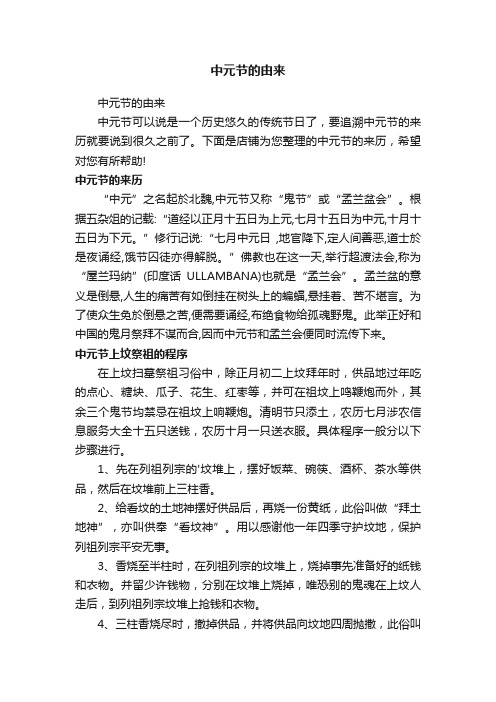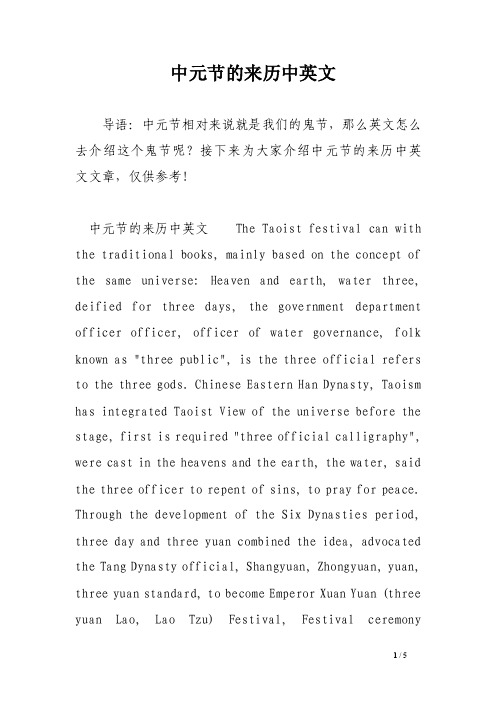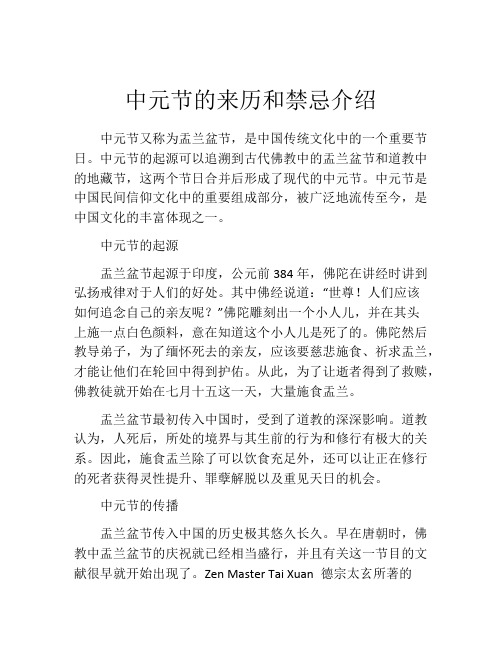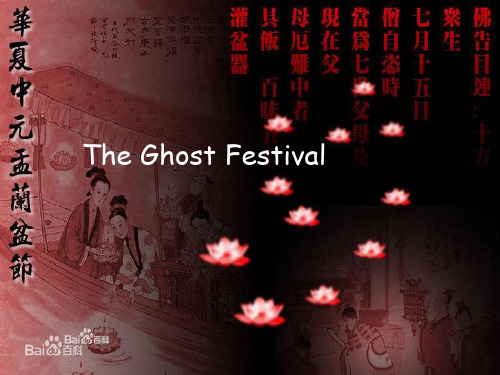中元节的来历及风俗中英文介绍
2024年中元节的真正来历介绍

2024 年中元节的真正来历介绍中元节的真正来历(介绍)中元节,是道教名称,民间世俗称为七月半,佛教则称为盂兰盆节。
节日习俗主要有祭祖、放河灯、祀亡魂、焚纸锭、祭祀土地等。
下面是我为大家整理的中元节的真正来历,仅供参考,喜爱可以保藏共享一下哟!中元节的由来这个节日源于早期的“七月半”农作丰收秋尝祭祖,“七月半”的产生可以追溯到上古的祖先崇拜与农事丰收时祭。
古时人们对于农事的丰收,常寄予于神灵的庇佑。
奉祀先祖在春夏秋冬皆有,但初秋的“秋尝”在其中非常重要。
秋天是收获的季节,人们实行向祖先亡灵献祭的仪式,把时令佳品先供神享,然后自己品尝这些劳动的果实,并祈祝来年的好收成。
中元节的传闻关于鬼节的来历,传闻地藏菩萨,他的母亲去世后来到阴曹地府,被关在牢房里少不得受十八层地狱的种种熬煎,地藏菩萨是个孝顺的女儿,看到母亲受罪心中不忍,在七月十五这天竟恂私情,让看管牢房的小鬼偷偷把牢门打开放他母亲出来,谁知这一开牢门没关系,牢房中的小鬼们蜂拥而出跑到人间为害百姓,所以就有了“七月半,鬼乱窜”之说。
那些跑回家乡的鬼纷纷向家人索要钱财以便回去用来生活和打通关节希望早日托生。
后来人们把这一天就定为“鬼节”。
中元节祭祀活动中元普渡中元是相当重要的民俗节日,不少人会在旧历的七月初一到七月卅日之间,择日以酒肉、糖饼、水果等祭品举办祭祀活动,以慰在人世间游玩的众家鬼魂,并祈求自己全年的平安顺当。
祭祖中元节祭祖祭祖节在阴历七月十五日,所以简称为“七月半”祭祖。
此时盛夏已经过去,秋凉刚刚起先。
民间信任祖先也会在此时返家探望子孙,故需祭祖。
祭拜的仪式一般在七月底之前傍晚时分实行,并不局限于特定的一天。
平常日子要对先人祭拜,一般都不动先人的牌位。
到“七月半”祭祖时,则要把先人的牌位一位一位请出来,恭尊敬敬地放到特地做祭拜用的供桌上,再在每位先人的牌位前插上香,每日晨、午、昏,供三次茶饭,直到七月卅日送回为止。
有先人画像的,也要请出挂起来。
中元节的由来

中元节的由来中元节的由来中元节可以说是一个历史悠久的传统节日了,要追溯中元节的来历就要说到很久之前了。
下面是店铺为您整理的中元节的来历,希望对您有所帮助!中元节的来历“中元”之名起於北魏,中元节又称“鬼节”或“孟兰盆会”。
根据五杂俎的记载:“道经以正月十五日为上元,七月十五日为中元,十月十五日为下元。
”修行记说:“七月中元日,地官降下,定人间善恶,道士於是夜诵经,饿节囚徒亦得解脱。
”佛教也在这一天,举行超渡法会,称为“屋兰玛纳”(印度话ULLAMBANA)也就是“孟兰会”。
孟兰盆的意义是倒悬,人生的痛苦有如倒挂在树头上的蝙蝠,悬挂着、苦不堪言。
为了使众生免於倒悬之苦,便需要诵经,布绝食物给孤魂野鬼。
此举正好和中国的鬼月祭拜不谋而合,因而中元节和孟兰会便同时流传下来。
中元节上坟祭祖的程序在上坟扫墓祭祖习俗中,除正月初二上坟拜年时,供品地过年吃的点心、糖块、瓜子、花生、红枣等,并可在祖坟上鸣鞭炮而外,其余三个鬼节均禁忌在祖坟上响鞭炮。
清明节只添土,农历七月涉农信息服务大全十五只送钱,农历十月一只送衣服。
具体程序一般分以下步骤进行。
1、先在列祖列宗的'坟堆上,摆好饭菜、碗筷、酒杯、茶水等供品,然后在坟堆前上三柱香。
2、给看坟的土地神摆好供品后,再烧一份黄纸,此俗叫做“拜土地神”,亦叫供奉“看坟神”。
用以感谢他一年四季守护坟地,保护列祖列宗平安无事。
3、香烧至半柱时,在列祖列宗的坟堆上,烧掉事先准备好的纸钱和衣物。
并留少许钱物,分别在坟堆上烧掉,唯恐别的鬼魂在上坟人走后,到列祖列宗坟堆上抢钱和衣物。
4、三柱香烧尽时,撤掉供品,并将供品向坟地四周抛撒,此俗叫做“拜四方”。
意思是给那些人去上坟的远亲近邻抛撒吃的,不让他们在上坟人走后,到列祖列宗的坟堆上抢吃的。
上坟应该注意哪些细节?扫墓时穿黑色衣服庄重肃穆,可以表达对先人的哀思,扫墓时反而不宜穿大红大绿的衣服,这种衣服与扫墓的气氛不协调,还是穿素色衣服比较适宜。
中元节的来历中英文

中元节的来历中英文导语:中元节相对来说就是我们的鬼节,那么英文怎么去介绍这个鬼节呢?接下来为大家介绍中元节的来历中英文文章,仅供参考!中元节的来历中英文 The Taoist festival can with the traditional books, mainly based on the concept of the same universe: Heaven and earth, water three, deified for three days, the government department officer officer, officer of water governance, folk known as "three public", is the three official refers to the three gods. Chinese Eastern Han Dynasty, Taoism has integrated Taoist View of the universe before the stage, first is required "three official calligraphy", were cast in the heavens and the earth, the water, said the three officer to repent of sins, to pray for peace. Through the development of the Six Dynasties period, three day and three yuan combined the idea, advocated the Tang Dynasty official, Shangyuan, Zhongyuan, yuan, three yuan standard, to become Emperor Xuan Yuan (three yuan Lao, Lao Tzu) Festival, Festival ceremonyparticipation rate Baiguan emperor. Since Tang and Song Dynasties, it has become a folk festival.道教节日能与传统民书相应,主要基于同一宇宙观:即天、地、水三界,被神格化为天官、地官、水官所统辖的三界府署,民间通称的"三界公",便是以三官泛指三界众神。
初中介绍中元节的英语作文

初中介绍中元节的英语作文English: The mid-year festival, also known as the Hungry Ghost Festival, is a traditional Chinese festival celebrated on the fifteenth day of the seventh lunar month. It is believed that during this time, the gates of the underworld are opened and the spirits of the deceased are free to roam the earth. To honor and appease these spirits, people offer food, burn incense, and perform various rituals. One of the most common customs is to set up an altar for the spirits and make offerings of food, drinks, and other necessities. In addition, elaborate paper-mâché figures are also crafted and burned as offerings to the spirits. The festival is also marked by various performances, such as traditional Chinese opera and puppet shows, as well as the release of paper lanterns and boats onto rivers and lakes to guide the spirits back to the underworld.中文翻译: 中元节,又称鬼节,是中国的传统节日,庆祝时间是农历七月十五日。
中元节的来历和禁忌介绍

中元节的来历和禁忌介绍中元节又称为盂兰盆节,是中国传统文化中的一个重要节日。
中元节的起源可以追溯到古代佛教中的盂兰盆节和道教中的地藏节,这两个节日合并后形成了现代的中元节。
中元节是中国民间信仰文化中的重要组成部分,被广泛地流传至今,是中国文化的丰富体现之一。
中元节的起源盂兰盆节起源于印度,公元前384年,佛陀在讲经时讲到弘扬戒律对于人们的好处。
其中佛经说道:“世尊!人们应该如何追念自己的亲友呢?”佛陀雕刻出一个小人儿,并在其头上施一点白色颜料,意在知道这个小人儿是死了的。
佛陀然后教导弟子,为了缅怀死去的亲友,应该要慈悲施食、祈求盂兰,才能让他们在轮回中得到护佑。
从此,为了让逝者得到了救赎,佛教徒就开始在七月十五这一天,大量施食盂兰。
盂兰盆节最初传入中国时,受到了道教的深深影响。
道教认为,人死后,所处的境界与其生前的行为和修行有极大的关系。
因此,施食盂兰除了可以饮食充足外,还可以让正在修行的死者获得灵性提升、罪孽解脱以及重见天日的机会。
中元节的传播盂兰盆节传入中国的历史极其悠久长久。
早在唐朝时,佛教中盂兰盆节的庆祝就已经相当盛行,并且有关这一节目的文献很早就开始出现了。
Zen Master Tai Xuan 德宗太玄所著的《庚申杂记》,就是唐朝记录盂兰盆节的一本书。
李白的《春园柳·杂言》,也记载了盂兰盆节的场景。
到了宋朝的时候,盂兰盆节已经逐渐形成了中国社会中独立的仪式。
这一传统由于秦时的焚书坑儒和后世的文化大革命期间一度被封杀。
但是由于人们在不同层面上都具有对祖先仰慕的信仰,因此这种传统事实上并没有消失。
当盂兰盆节在今天重新复苏时,已经与传统道教、佛教信仰不同,更多地与祭祖、祭先人由来已久的中国习俗联系在一起。
有关中元节的传说和记载也更多地反映了这种联系。
中元节的禁忌除了庆祝和祭祖,中元节也有一些禁忌需要注意。
这是基于中元节的与祖先有关的性质,一些习俗也在其中起到了重要的角色。
以下是中元节的一些禁忌:第一、不要在晚上外出,晚上行动会让鬼神更加容易寄宿与人。
中元节英文简介-The Ghost Festival

1.A brief introduction 2.The origin of the Ghost Festival 3.Main activities
In Chinese tradition, the fifteenth day (in someplace of south China it is the fourteenth day)of the seventh month in the lunar calendar is called the Ghost Festival, and the seventh lunar month in general is regarded as the Ghost Month, in which ghosts and spirits, including those of the deceased ancestors, come out from the lower realm。In Taoism this festival is also called "Zhongyuan Festival",and in Buddism it is called "Obon Festival". It is also called"the Mid-July day" among Chinese people. It is believed during the seventh lunar month, the gates of hell are thrown open, releasing hungry ghosts to wander the earth in search of food and taking revenge upon those who wronged them in life. So this festival is also called " the Hungry Ghost Festival ".
中元节的英文介绍作文

中元节的英文介绍作文中元节的英文介绍作文在日常学习、工作和生活中,大家最不陌生的就是作文了吧,写作文可以锻炼我们的独处习惯,让自己的心静下来,思考自己未来的.方向。
那么你知道一篇好的作文该怎么写吗?下面是小编帮大家整理的中元节的英文介绍作文,仅供参考,欢迎大家阅读。
The Ghost Festival, also known as the Hungry Ghost Festival, is a traditional Chinese festival and holiday celebrated by Chinese in many countries. In the Chinese calendar (a lunisolar calendar), the Ghost Festival is on the 15th night of the seventh lunar month (14th in southern China).In Chinese tradition, the fifteenth day of the seventh month in the lunar calendar is called Ghost Day and the seventh month in general is regarded as the Ghost Month (鬼月), in which ghosts and spirits, including those of the deceased ancestors, come out from the lower realm. Distinct from both the Qingming Festival (in Spring) and Chung Yeung Festival (in Autumn) in which living descendants pay homage to their deceased ancestors, on Ghost Day, the deceased are believed to visit the living.On the fifteenth day the realms of Heaven and Hell and the realm of the living are open and both Taoists and Buddhists would perform rituals to transmute and absolve the sufferings of the deceased. Intrinsic to the Ghost Month is ancestor worship, where traditionally the filial piety of descendants extends to their ancestors even after their deaths. Activities during the month would include preparing ritualistic food offerings, burning incense, and burning joss paper, a papier-mché form of material items such as clothes, gold and other fine goods for the visiting spirits of the ancestors. Elaborate meals (often vegetarian meals)would be served with empty seats for each of the deceased in the family treating the deceased as if they are still living. Ancestor worship is what distinguishes Qingming Festival from Ghost Festival because the latter includes paying respects to all deceased, including the same and younger generations, while the former only includes older generations. Other festivities may include, buying and releasing miniature paper boats and lanterns on water, which signifies giving directions to the lost ghosts and spirits of the ancestors and other deities.The Ghost Festival is celebrated during the seventh month of the Chinese calendar. It also falls at the same time as a full moon, the new season, the fall harvest, the peak of Buddhist monastic asceticism, the rebirth of ancestors, and the assembly of the local community. During this month, the gates of hell are opened up and ghosts are free to roam the earth where they seek food and entertainment. These ghosts are believed to be ancestors of those who forgot to pay tribute to them after they died, or those who were never given a proper ritual send-off. They have long needle-thin necks because they have not been fed by their family, or as a punishment so that they are unable to swallow. Family members offer prayers to their deceased relatives, offer food and drink and burn hell bank notes and other forms of joss paper. Joss paper items are believed to have value in the afterlife,considered to be very similar in some aspects to the material world, People burn paper houses, cars, servants and televisions to please the ghosts. Families also pay tribute to other unknown wandering ghosts so that these homeless souls do not intrude on their lives and bring misfortune. A large feast is held for the ghosts on the fourteenth day of the seventh month, when people brings samples of food and places them on an offeringtable to please the ghosts and ward off bad luck.In some East Asian countries today, live performances are held and everyone is invited to attend. The first row of seats are always empty as this is where the ghosts sit. The shows are always put on at night and at high volumes as the sound is believed to attract and please the ghosts. Some shows include Chinese opera, dramas, and in some areas, even burlesque shows. These acts are better known as "Merry-making".For rituals, Buddhists and Taoists hold ceremonies to relieve ghosts from suffering, many of them holding ceremonies in the afternoon or at night (as it is believed that the ghosts are released from hell when the sun sets). Altars are built for the deceased and priests and monks alike perform rituals for the benefit of ghosts. Monks and priests often throw rice or other small foods into the air in all directions to distribute them to the ghosts.During the evening, incense is burnt in front of the doors households. Incense stands for prosperity in Chinese culture, so families believe that there is more prosperity in burning more incense.[4]During the festival, some shops are closed as they want to leave the streets open for the ghosts. In the middle of each street stands an altar of incense with fresh fruit and sacrifices displayed on it.Fourteen days after the festival, to make sure all the hungry ghosts find their way back to hell, people flow water lanterns and set them outside their houses (a practice that can be found amongst the Japanese during Obon). These lanterns are made by setting a lotus flower-shaped lantern on a paper boat. The lanterns are used to direct the ghosts back to the underworld, and when they go out, it symbolizes that they have found their way back.。
浅析如何用英文讲述中元节起源与习俗

浅析如何用英文讲述中元节起源与习俗今天是农历七月十五日,恰好是“中元节”,俗称鬼节,那你知道如何用英文讲述中元节的来源与习俗吗?中文大家肯定都知道,今天小编在此与大家分享如何用英文讲述中元节的来源与习俗,大家不妨来了解下中英对照吧。
【词汇】Hungry Ghost Festival 中元节(也叫“鬼节”)The Hungry Ghost Festival is celebrated on the 15th day of the seventh lunar month.中元节在农历七月十五日。
【中元节的起源】The origin of the Hungry Ghost Festival and the Ghost Month in China is uncertain. Cultures in Asia from India to Cambodia to Japan share similar beliefs about the month, and these traditions seem to date from before Buddha.中元节是否起源于中国并不确定。
关于该节日的文化在一些亚洲国家诸如印度、柬埔寨、日本都信奉着相似的信仰,似乎这些传统都起源于佛教。
According to Taoism, the gates of hell are opened on the first day of the seventh month, and hungry ghosts are released to find food or to take revenge on those who have behaved badly according to Taoist records.根据道教说法,农历七月的第一天地狱之门将打开,饥饿的鬼魂得以释放去寻找食物或报复那些道家记载的作恶多端的人。
【中元节习俗】Family members offer prayers to their deceased relatives, offer food and drink and burn hell bank notes and other forms of joss paper.家庭成员向已故的亲人祈祷,送上祝福,奉上食物和饮料,烧一些诸如冥币这样的纸钱给他们。
- 1、下载文档前请自行甄别文档内容的完整性,平台不提供额外的编辑、内容补充、找答案等附加服务。
- 2、"仅部分预览"的文档,不可在线预览部分如存在完整性等问题,可反馈申请退款(可完整预览的文档不适用该条件!)。
- 3、如文档侵犯您的权益,请联系客服反馈,我们会尽快为您处理(人工客服工作时间:9:00-18:30)。
中元节的来历及风俗中英文介绍
Just as Halloween is for Americans, the “Hungry Ghost Festival”is for Chinese. Ghost Festival is one of Chinese traditional occasions, which is taken very seriously by the Chinese. This festival usually falls on the15th day of the 7th month of the lunar calendar. The Ghost Festival, some places say the Hungry Ghost Festival, is also called Half July (Lunar), Ullambana, which is closely related to Buddhism, and zhongyuan jie which is the Taoism saying and Folk Belief.
就像万圣节对于美国人一样,中国也有鬼节。
鬼节是中国传统节日之一,并且被中国人认真看待。
这个节日通常是阴历七月十五。
鬼节(有些地方翻译为饿鬼节),又叫七月半,佛教称之为盂兰盆节,中元节是道教的称法,同时也是一种民间说法。
It is believed by the Chinese that the dead become ghosts roaming between Heaven and Earth unless they have descendants to care for them during the Ghost Festival. During this month, the gates of hell are opened to free the hungry ghosts who then wander to seek food on Earth. Some even think that the ghosts would seek revenge on those who had wronged them in their lives. However, more people remember their ancestors on this day. The Ghost Festival becomes a time for remembering the importance of filial piety. The reason why the Chinese celebrate this festival is to remember their dead family members and pay tribute to them. They also feel that offering food to the deceased appeases them and wards off bad luck. People now release river lights as an important activity during this time, since it is said that river light can comfort and warm the homeless ghosts. In some areas, visitors may also see small roadside fires, where believes burn paper money and other offerings to appease the restless spirits who have temporarily been released from Hades.
中国人认为除非一个人有子孙后代能够在他死后在鬼节这天悼念他们,否则人死后会变成鬼魂在天地之间游荡。
在七月,地狱的大门会打开放出饿鬼,这些饿鬼会在凡间寻找食物。
一些人更认为他们会向那些害死他们的人复仇。
但是,更多的人在这一天祭奠他们的先人。
鬼节成为一个子女对先人尽孝的节日。
中国人庆祝这个节日的原因是纪念他们家中死去的成员并且悼念死者。
他们相信祭品能安抚死者,消除厄运。
放河灯是人们纪念鬼节的重要活动,因为据说河灯能给无家可归的孤魂野鬼以慰藉和温暖。
在一些地区,外来者会看见路边一小堆一小堆的火,因为人们相信烧纸钱或其它东西能安抚刚从地狱出来的痛苦幽魂。
